
VAR Review: Match Day 16
The VAR Review: Looking at Controversial Calls in the Premier League
The Video Assistant Referee (VAR) in the Premier League is a hot topic every week, with fans and experts discussing questionable calls. This week, we highlight important incidents, like a red card for Liverpool’s Andrew Robertson, a penalty shout in the Manchester derby, and other key moments.
Liverpool 2-2 Fulham – Andrew Robertson’s Red Card
One of the most talked-about events happened in the 16th minute of Liverpool‘s game against Fulham. Andrew Robertson tried to stop a ball meant for Harry Wilson but made a mistake, letting Wilson take the ball. Robertson then fouled Wilson as the ball went to Raúl Jiménez, who almost scored. The referee, Tony Harrington, stopped the game and gave Robertson a red card for stopping a clear chance to score.
The VAR looked at whether it was a clear chance and if there was an offside. They agreed it was a foul, but some thought Wilson’s heavy touch made it unclear if he could have scored. In the end, VAR confirmed the red card, but it’s still a debated call. Liverpool might appeal the red card, which would keep Robertson out of their next game against Southampton.
Fulham 2-2 Liverpool – Possible Red Cards for Diop and Pereira
Early in the match, Fulham’s Issa Diop received a yellow card for a high challenge on Robertson. The VAR checked if it deserved a red card but decided a yellow was enough. Diop’s tackle hit Robertson’s leg, but it seemed more like a mistake than a dangerous foul. The decision to keep the yellow card matched similar calls this season.
Another Fulham player, Andreas Pereira, also faced a possible red card for stepping on Ryan Gravenberch’s heel. The VAR review saw it as a yellow card since it wasn’t too forceful. These decisions show how different officials may see similar fouls differently.
Manchester City 1-2 Manchester United – Possible Penalty for Højlund
In the Manchester derby, Rasmus Højlund from Manchester United asked for a penalty after being challenged by Manchester City’s Rúben Dias. The referee gave a goal kick instead, and VAR did not step in. Although there was some contact, it wasn’t enough for a penalty. This shows how tough VAR’s job is, as there wasn’t enough proof to change the referee’s call.
Nottingham Forest 2-1 Aston Villa – Possible Penalty for Rogers
In a close match between Nottingham Forest and Aston Villa, Morgan Rogers fell in the penalty area after being touched by Elliot Anderson. The VAR reviewed the situation and decided no penalty was needed. There have been similar situations this season where minor contact didn’t lead to a penalty. In this case, the VAR thought Anderson’s touch didn’t significantly stop Rogers from playing.
Other important calls included a possible red card for Bruno Guimarães in Newcastle’s 4-0 win over Leicester, a possible offside during Ipswich’s last-minute goal at Wolves, and a penalty appeal in Arsenal’s 0-0 draw with Everton. These examples show how different interpretations can lead to different VAR decisions.
For instance, Guimarães’ action was reviewed for a second yellow card but remained a yellow due to how it was done. Similarly, the offside call in the Ipswich-Wolves match showed the small differences that matter in determining if a player is blocking the goalkeeper.
Though a crucial part of modern day football, the use of VAR in the Premier League keeps changing, but it still causes disagreements among fans and players. While it aims to make outcomes fairer by adding another level of review, the subjective nature of many calls means debates will continue. The latest VAR reviews show the difficulties referees face in applying the rules fairly, especially in fast and intense games.
Leave a Reply